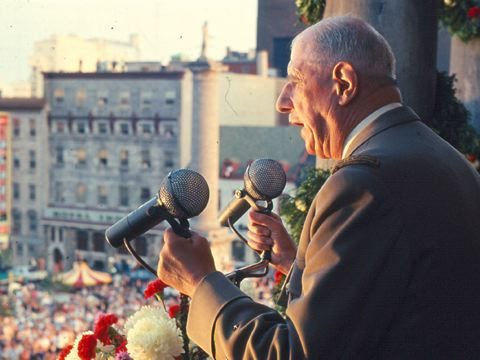In July 1967, French President Charles De Gaulle visited La Belle Province. With Ottawa fixated on the United States, Quebec Premier Daniel Johnson, like many Quebecers at the time, believed Quebec needed to rely on France to allow Quebec's voice to be heard around the globe. Johnson therefore invited the World War II hero to travel overseas, officially to visit the Montreal World Expo.
The General had a sense of history and responded favorably to Johnson's invitation. He arrived in Quebec City on July 23rd. He made the trek to Montreal on the Chemin du Roy, along the majestic St. Lawrence River.
Thousands of people were cheering him along the way, on land and on sea, in towns and villages. This trip is legendary and partly built on a myth, as a whole fleet of buses were loading and unloading people in order to gather the biggest crowd possible.
The trip culminated on July 24th, St-Jean Baptiste Day, when Montreal City Mayor Jean Drapeau invited him to visit City Hall. De Gaulle decided to address the 15,000 people massed in front of City Hall from the balcony, where someone had "forgotten" to unplug and remove two microphones.
His speech is said to have been improvised, but his words had been thought long and hard: "Tonight here, and all along my route, I found myself in an atmosphere of the same kind as that of the Liberation. In addition to this, I have seen what an immense effort of progress, of development, and consequently of emancipation, you are accomplishing here … "
De Gaulle concluded with his most famous words on Canadian soil: "Vive Montréal ! Vive le Québec ! Vive le Québec… libre! " An independentist slogan had been unleashed upon the enthusiastic crowd. (He also added a couple of more sentences: "Vive le Canada français ! Et vive la France ! " But nobody remembers that part.)
The statement of the French President fuelled the ardor of the independence circles, helping their momentum which led, the following year, to the foundation of the Parti Québécois by René Lévesque. The PQ was elected in 1976, held a referendum in 1980, the Bloc Québécois became the Queen's Official Opposition in Ottawa in 1993, another referendum was held in 1995. Since then, there has been a slow but steady decline.
Yet, 50 years later, the impact of De Gaulle's words is still felt in Quebec.
A plan by the Société Saint-Jean-Baptiste to commemorate the 50th anniversary of the event on the very balcony where it occurred was nixed by Mayor Denis Coderre. A City Hall spokesperson stated that "City Hall is neutral and apolitical," conveniently ignoring the fact the balcony's usage was authorized in 1997 to commemorate the 30th anniversary, or the fact the Montreal City Hall was marking the occasion with a week-long de Gaulle exhibit within its walls, including a visit of the balcony.
Perhaps Coderre, a staunch federalist, was worried this anniversary could give some sparks to the separatists? Looking at where things stands 50 years after De Gaulle, it's hard to believe it could happen. The PQ is languishing in 3rd place in the polls and is threatened to be overtaken by 4th place Québec Solidaire. The Bloc Québécois has not been an official party in the House of Commons for over six years and people don't seem to miss them much.
In politics, a week is a lifetime. But considering how much content was published in Quebec about the De Gaulle's 50 year-old words in July alone, one should be reminded that ideas can survive much longer than a lifetime.









